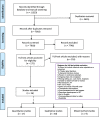Informal carers' experience of assistive technology use in dementia care at home: a systematic review
- PMID: 31196003
- PMCID: PMC6567448
- DOI: 10.1186/s12877-019-1169-0
Informal carers' experience of assistive technology use in dementia care at home: a systematic review
Abstract
Background: Dementia is a health and care priority globally. Caring for persons with dementia is a challenge and can lead to negative psychological, physiological and financial consequences for informal carers. Advances in technology have the potential to assist persons with dementia and their carers, through assistive technology devices such as electronic medication dispensers, robotic devices trackers and motion detectors. However, little is known about carers' experience and the impact of these technologies on them. This review aims to investigate the outcomes and experience of carers of persons with dementia, who live at home and use assistive technology.
Methods: A systematic search in seven databases and manual searches were carried out using pre-defined inclusion and exclusion criteria to identify studies on carers of persons with dementia involving the use of assistive technology. The search identified 56 publications with quantitative, qualitative and mixed-method designs.
Results: The studies reported positive and negative findings and focused on a wide variety of assistive technology devices. There were large differences in the uses of assistive technology, outcome measures used and the quality of studies. Knowledge and acceptance, competence to use and ethical issues when using assistive technology were themes that emerged from the studies. Carers generally appreciated using assistive technology and their experience of use varied.
Conclusions: The intention of this systematic review is to list and classify the various types of assistive technology used by carers of persons with dementia and explores the positive and negative aspects, knowledge, acceptance and ethical issues in the use of assistive technology by carers of persons with dementia. We recommend the use of a standard and person-centred system of classifying and naming assistive technology devices and systems and for future research efforts in assistive technology to incorporate a family/carer centred model.
Systematic review registration: PROSPERO - CRD42017082268 .
Keywords: Assistive technology; Carers; Dementia; Quality of life; Systematic review; Well-being.
Conflict of interest statement
The authors declare that they have no competing interests.
Figures
Similar articles
-
Informal carers' experience and outcomes of assistive technology use in dementia care in the community: a systematic review protocol.Syst Rev. 2019 Jul 3;8(1):158. doi: 10.1186/s13643-019-1081-x. Syst Rev. 2019. PMID: 31269995 Free PMC article.
-
Carers' experience of using assistive technology for dementia care at home: a qualitative study.BMJ Open. 2020 Mar 18;10(3):e034460. doi: 10.1136/bmjopen-2019-034460. BMJ Open. 2020. PMID: 32193267 Free PMC article.
-
Carers using assistive technology in dementia care at home: a mixed methods study.BMC Geriatr. 2022 Jun 8;22(1):490. doi: 10.1186/s12877-022-03167-4. BMC Geriatr. 2022. PMID: 35672662 Free PMC article.
-
Technology-based tools and services for people with dementia and carers: Mapping technology onto the dementia care pathway.Dementia (London). 2019 Feb;18(2):725-741. doi: 10.1177/1471301217691617. Epub 2017 Feb 8. Dementia (London). 2019. PMID: 28178858 Review.
-
Informal carers' information needs in managing behavioural and psychological symptoms of people with dementia and related mHealth applications: a systematic integrative review to inform the design of an mHealth application.BMJ Open. 2023 May 11;13(5):e069378. doi: 10.1136/bmjopen-2022-069378. BMJ Open. 2023. PMID: 37169501 Free PMC article.
Cited by
-
Can Technology-Based Social Memory Aids Improve Social Engagement? Perceptions of a Novel Memory Aid for Persons With Memory Concerns.J Appl Gerontol. 2023 Mar;42(3):399-408. doi: 10.1177/07334648221134869. Epub 2022 Oct 22. J Appl Gerontol. 2023. PMID: 36274581 Free PMC article.
-
Patterns of home- and community-based services in older adults with dementia: an analysis of the long-term care system in Taiwan.BMC Geriatr. 2021 May 1;21(1):290. doi: 10.1186/s12877-021-02231-9. BMC Geriatr. 2021. PMID: 33933031 Free PMC article.
-
Access to, use of, and experiences with social alarms in home-living people with dementia: results from the LIVE@Home.Path trial.Front Aging Neurosci. 2023 May 22;15:1167616. doi: 10.3389/fnagi.2023.1167616. eCollection 2023. Front Aging Neurosci. 2023. PMID: 37284020 Free PMC article.
-
Self-reported symptoms of depression and anxiety among informal caregivers of persons with dementia: a cross-sectional comparative study between Sweden and Italy.BMC Health Serv Res. 2020 Dec 2;20(1):1114. doi: 10.1186/s12913-020-05964-2. BMC Health Serv Res. 2020. PMID: 33267856 Free PMC article.
-
Can assistive technology support social services during Covid-19 emergency? Barriers and opportunities.Int J Interact Des Manuf. 2022;16(1):359-370. doi: 10.1007/s12008-021-00836-3. Epub 2022 Feb 3. Int J Interact Des Manuf. 2022. PMID: 40477950 Free PMC article.
References
-
- World Health Organisation. ICD-11 - mortality and morbidity statistics: World Health Organisation; 2018. https://icd.who.int/browse11/l-m/en. Accessed 30 Aug 2018
-
- World Health Organisation. Dementia. Key facts: World Health Organisation Key facts; 2017. http://www.who.int/news-room/fact-sheets/detail/dementia. Accessed 30 Aug 2018
-
- Prince M, Knapp M, Guerchet M, McCrone P, Prina M, Comas-Herrera A, et al. Dementia UK: update second edition. London; 2014. https://www.alzheimers.org.uk/download/downloads/id/2323/dementia_uk_upd.... Accessed 27 Nov 2017
Publication types
MeSH terms
LinkOut - more resources
Full Text Sources
Medical


